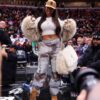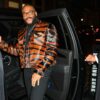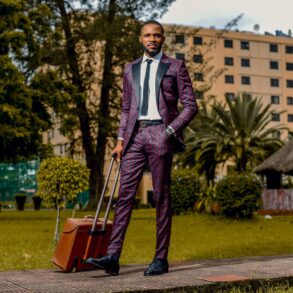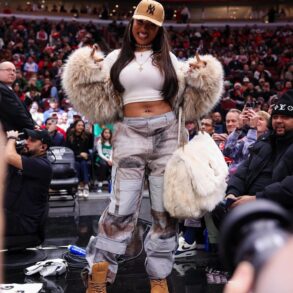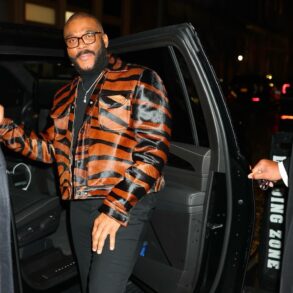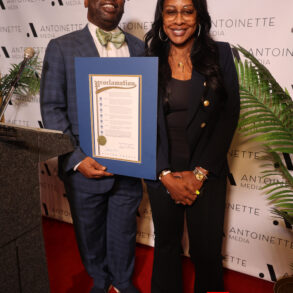Image
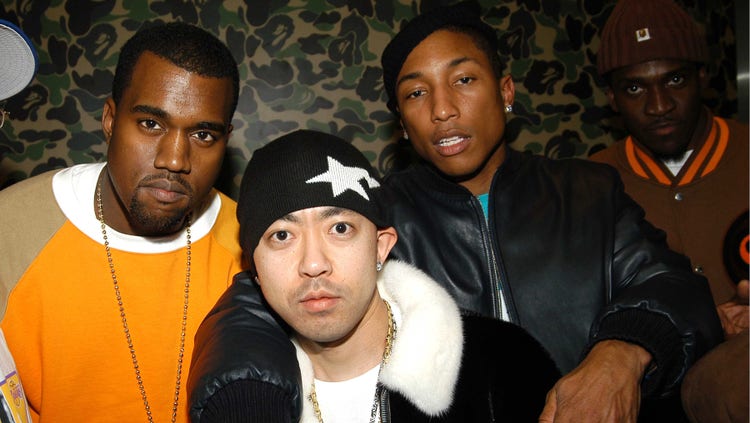
Image Credit
Patrick McMullan / Contributor via Getty Images
Image Alt
Kanye West, Nigo, Pharrell Williams and Pusha-T
During the 1990s and 2000s, the intersection of hip hop culture and fashion led to the rise of several brands that ultimately transformed into symbols of status and style. Rappers not only influenced trends but also played a pivotal role in introducing and popularizing mainstays like BAPE, Supreme, Tommy Hilfiger and True Religion.
The era also witnessed a unique convergence of high-end luxury and streetwear, with brands like Iceberg and Pelle Pelle gaining favor within the genre. Versace’s bold designs were immortalized by icons such as Tupac and Diddy, while Coogi’s colorful knitwear became synonymous with The Notorious B.I.G. Moreover, the impact extended beyond clothing to footwear, with Timberland boots, Air Jordans and Nike sneakers becoming go-to choices.
While many labels and trends briefly captured the spotlight, REVOLT rounded up 11 brands that rappers loved during the ’90s and 2000s.
1. BAPE
A Bathing Ape (BAPE) was founded in Tokyo in 1993 by Nigo, who emerged as a pioneer in infusing rap’s aesthetic with Japanese street style. Its signature camouflage patterns, shark hoodies and high-profile sneaker collaborations became iconic within the industry. The designs were worn by artists like Kanye West, Pusha T, Big Sean and Pharrell in the early 2000s.
BAPE’s collaborations with rappers, such as the Bape Sta Low Kanye West College Dropout, elevated the brand’s status and solidified its role in shaping the aesthetic of hip hop fashion internationally.
“I think Nigo is just as important and significant to hip hop as a Pharrell, or a Slick Rick or Kanye — not as far as musical ability,” ASAP Rocky explained to Complex in 2018. “I would say how he influenced people’s style and how he just came through with a new way to rock s**t.”
2. Pelle Pelle
Pelle Pelle’s leather jackets became synonymous with hip hop’s golden era, as founder Marc Buchanan crafted iconic outerwear that captured the essence of New York’s urban music scene in the ‘80s and ‘90s. Notable hip hop artists, including Grandmaster Flash and the Furious Five, were among some of its first wearers. Fast forward several years later, and Pelle Pelle’s influence persists today, reflected in contemporary designs from Supreme to Balenciaga that pay homage through archive-inspired details and heavy logos.
Additionally, Kanye West’s mention of the brand on “Pure Souls” and his appearance in a Pelle Pelle jacket on Netflix’s “jeen-yuhs” docuseries highlighted its continued relevance. Boz Bradshaw, who assisted in styling the likes of JAY-Z and Cam’ron, told Complex in 2022, “It was a feeling that you felt wearing those leathers. When you rocked a Pelle, it wasn’t for middle or upperclass America to look at you and go, ‘Oh, nice.’ It was for everybody else and the people who understood. You found your identity in those jackets.”
3. True Religion
True Religion jeans became a staple thanks to their instantly recognizable Super T stitch and horseshoe emblem. The design was once ubiquitous in hip hop’s golden era, gracing the backsides of stalwarts like Jim Jones and even 2 Chainz’s T.R.U. REALigion album art. Celebrating 21 years, the label revisited its relationship with the genre through collaborations with Atlanta’s Lil Gnar and Kaliii, as well as Chief Keef’s Glo Gang.
The brand commemorated the 10-year anniversary of the Chicago rapper’s 2012 hit “True Religion Fien” with a high-profile capsule collection that boasted hearts, skulls and bone details across various T-shirts, joggers, jeans and jackets. Even in light of its revival, mainstays like Sexyy Red, Latto and Ice Spice are repping the brand amid other Y2K trends resurging.
4. Iceberg
Founded in Milan in 1974, Iceberg established itself as a pioneer of luxury sportswear. The brand became synonymous with vibrant knitwear, bold colors and its emblematic use of cartoon motifs. Initially embraced by Italy’s Paninaro youth, it soon found favor with the casual scene, becoming a staple in the wardrobes of ’80s and ’90s style enthusiasts.
By the ’90s, Iceberg crossed into hip hop royalty, with icons like JAY-Z name-dropping the brand in tracks like “Jigga My N**ga.” The fashion house also attracted names like Fabolous and Nas before going defunct.
Iceberg turning down Hov’s idea of creating a separate clothing line is actually what led to the rapper starting his own brand, Rocawear. He explained to WWD, “I would be on stage performing, and I noticed that all the kids were wearing Iceberg jeans. The same jeans that I would wear. So we thought, ‘Why should we let Iceberg get all this business when we can do it ourselves?’”
5. Supreme
The New York-based streetwear brand Supreme is renowned for its tribute to music legends across genres, from lyrical heavyweights like Public Enemy and Raekwon to jazz legends such as Miles Davis and Isaac Hayes. Though not sprouted from hip hop soil, the label’s box logo apparel has been spotted on notable figures, including Travis Scott, ASAP Rocky, Tyler, the Creator, YoungBoy Never Broke Again, André 3000, Drake and Playboi Carti.
Despite its high-fashion collaborations and global recognition, Supreme is among the few brands on this list to maintain its core street ethos. Since its founding in 1994, the label still embodies the spirit of the genre without ever compromising its skateboarding roots.
6. Tommy Hilfiger
Tommy Hilfiger emerged during the late 1980s and early 1990s alongside the genre’s commercial rise. During his 1992 feature on Mary J. Blige’s “What’s the 411?” Grand Puba was the first rapper to mention the brand. It marked the beginning of Hilfiger’s induction into hip hop fashion, as emcees started embracing the designer’s preppy, Ivy League-inspired style.
In 1996, the label deepened its commitment to the culture with the launch of Hilfiger Denim, later known as Tommy Jeans. The line was younger and more aligned with streetwear trends. Hilfiger capitalized on his connections by featuring artists like Aaliyah, Raekwon, Method Man, Naughty by Nature, TLC and Mary J. Blige in iconic runway shows and campaigns. It also attracted key figures like JAY-Z, Diddy and Russell Simmons, who the designer cited as an early inspiration.
“I started just making oversized, and it was a perfect storm. I was dressing Puff Daddy for his tours. I was dressing Biggie Smalls. I was dressing Tupac,” Hilfiger told The Guardian in February.
7. Timberland
Timberland is another brand rooted in New York hip hop. Artists like Mobb Deep, Aaliyah, Smif-N-Wessun, Cam’ron, and Wu-Tang Clan incorporated the footwear company’s 6-inch Waterproof Boot into their style and lyrics. For instance, Biggie referenced, “Timbs for my hooligans in Brooklyn” in his 1997 song “Hypnotize,” while Nas mentioned, “Suede Timbs on my feets makes my cipher complete” in his 1994 track “The World is Yours.”
Between 1991 and 2000, Timberland’s profits soared from $80 million to over $500 million, with revenues surpassing $1 billion by 2000, per CNBC. The brand’s growth paralleled the increasing influence of Black consumer spending in the 1990s, particularly when it came to footwear and clothing. The genre’s early adoption of Timbs paved the way even beyond the millennium, with Kanye West and ASAP Rocky wearing the boots in later years.
8. Coogi
When you think of Coogi, The Notorious B.I.G. immediately comes to mind. The late Brooklyn emcee wore the Australian brand’s colorful, textured knits all throughout the ’90s, even referencing them in his songs. In his smash hit “Hypnotize,” he rapped, “Every cutie with a booty bought a Coogi.” The label also appeared in the music video for “Big Poppa.”
“My man had all the Coogis and the Kangols. And I got the pictures where G got his Kangol on and his Coogi, but [B.I.G.] had on Army jackets and Timberlands,” stylist Groovey Lew shared with MTV in 2009. “So [B.I.G.] fell in love with this kid’s style right there — just took it to the next level for the world to see.”
While the brand never became a mainstay in hip hop like others on this list, its continued relevance is noticeable through some of today’s stars. Snoop Dogg, Drake, ASAP Yams, Mac Miller, Coi Leray and Rob49 are among the artists who’ve worn the brand in the past decade.
9. Nike and Air Jordan
Hip hop’s affinity for Nike — and specifically Air Jordans — is well-documented and present even to the current day. Rappers like N.W.A. wore the Nike Cortez throughout the early ’90s, while LL Cool J sported the Jordan 1 ’85 “Bred” on the original cover art of his debut album, Radio. The 2000s propelled one of the most iconic sneakers in history: The Nike Air Force 1. From Nelly’s “Air Force Ones” to Fat Joe’s Terror Squad and JAY-Z receiving exclusive pairs, the genre quickly embraced its monochrome color way.
Eminem was actually one of the first emcees to get his own pair of Nikes in the form of the Air Jordan 4 “Encore” in 2005. Limited to only 50 pairs, the shoe paid homage to the Detroit native’s LP of the same name. Meanwhile, Kanye West wore a sample of the Nike Air Yeezy to the 2008 Grammy Awards. “Once Jordan came into play, all the sneakers from Nike seemed to turn to Air this and Air that,” Nas shared with Complex in 2014. “Air Max was like the Air Jordan’s cousin. So you wanted all the Air Jordans. I just started racking up on sneakers. Whatever was new.”
Even when you fast forward to today, there are collaborations like Travis Scott’s Air Jordan 1, Drake’s Nike NOCTA and Kendrick Lamar’s Nike Cortez.
10. Versace
Before Migos’ 2013 smash hit “Versace” rose to popularity, the luxury fashion house’s bold, baroque-style prints epitomized a flashy lifestyle that resonated with the likes of JAY-Z, Jermaine Dupri and Diddy throughout the ’90s. New York hip hop was undoubtedly one of the early adopters of the brand. The Notorious B.I.G.’s 1995 appearance in the “One More Chance” video featured Versace’s Medusa-emblem sunglasses, while Lil Kim wore a logo-printed wig at the label’s Spring/Summer 2001 fashion show.
Other nods included Xscape wearing the label on their “Feels So Good” single cover. Meanwhile, Tupac Shakur demonstrated Versace’s influence by wearing the brand at the 38th Grammy Awards and even walking in one of its fashion shows in Italy in 1996. Not to mention, Diddy frequently sported the brand in his public appearances, including on the cover of Rolling Stone in 1997.
11. Ecko Unlimited
Starting as a small T-shirt company, Ecko Unlimited was founded by Marc Ecko in 1993. Its street-inspired style and bold designs were largely inspired by a blend of graffiti art, hip hop and skate culture. The brand’s expansion into a full clothing line introduced the signature rhino logo, which could be spotted on various hoodies, jeans and tank tops, among others. Meanwhile, musicians like 50 Cent, Eminem, Capone-N-Noreaga, DMX and Ghostface Killah helped bolster the label’s visibility in the genre during the late ‘90s and early 2000s.
“If you look at what was happening within hip hop culture at the time, there was this mogul thing that was a part of the extreme sport of being at the top of your game,” Ecko explained to Complex in November. “Constraints drive better creative execution. But I don’t regret trying all those different things. I learned a lot.”
This post was originally published on this site be sure to check out more of their content.


